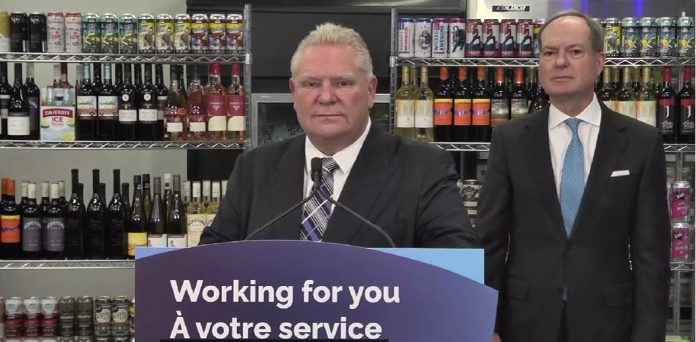
ETOBICOKE: Ontario Premier Doug Ford announced today that in 2026 consumers will be able to buy beer, wine, cider, coolers, seltzers, and other low-alcohol ready-to-drink beverages at all participating convenience, grocery and big box stores across the province.
The province says that “this new, more open marketplace will introduce up to 8,500 new stores” where these products can be purchased. Spirits like vodka, gin and whisky will continue to be sold at the LCBO.
“We made a promise to the people of Ontario to deliver more choice and convenience,” said Premier Doug Ford. “Today, we’re delivering on that promise. There’s no reason why Ontario consumers shouldn’t enjoy the same convenient shopping experience as Canadians in every other province when buying some wine for their holiday party or a case of beer or seltzers on their way to the cottage.”
As a first step in the transition to a new retail marketplace, the government has informed Brewers Retail Inc. (The Beer Store) that the Master Framework Agreement (MFA), signed and extended for ten years by the previous government in 2015 and limited the number of retail stores that could be authorized to sell alcohol, will not be renewed after it expires on December 31, 2025. The Beer Store and LCBO will continue their retail operations in Ontario’s new marketplace.
Competitive pricing will be introduced to all private retailers to promote competition and a better deal for consumers. LCBO retail stores will maintain consistent pricing across the province to help ensure consumers do not pay more based on where they live, including in rural and northern Ontario. As they do in other provinces, retailers will have the option to set promotional prices consistent with relevant regulations. Minimum pricing policies will remain in effect to preserve standards for responsible consumption.
The province is also removing restrictions and exclusivities on pack sizes. Consumers will be able to purchase any pack size, including 12-packs, 24-packs or even 30-packs as is popular in Quebec of beer, cider and ready-to-drink alcohol beverages at convenience, grocery and big box stores, in addition to the LCBO and The Beer Store.
The Beer Store has agreed to continue to run the provincewide recycling program for alcoholic beverage containers until at least 2031 as part of a transition period in the new marketplace.
The province has committed to providing an additional $10 million over five years in funding to the Ministry of Health to support social responsibility and public health efforts to ensure alcohol continues to be sold and consumed safely in the expanded marketplace. Existing requirements related to staff training, minimum pricing, hours of sale and warning signs will be maintained and applied to all new retail outlets.
“The people of Ontario will soon have more choice and convenience on where they can buy alcohol,” said Peter Bethlenfalvy, Minister of Finance. “As we move towards implementing this expansion, our government will be taking a responsible, measured approach so we can ensure our transition to a new marketplace is smooth, safe and stable.”
The LCBO will be the exclusive wholesaler for all retail, bars and restaurants selling alcohol and will offer consumers an extensive array of choices, including domestic and imported products. This structure will continue to offer the benefits of the LCBO’s world-leading purchasing power and economies of scale and ensures sector stability, including maintaining an important employment footprint across Ontario and a significant revenue stream for government so that it can continue to invest in critical frontline services like health care and education. The province is proud of its LCBO workforce and will continue to support them through this transition.
The LCBO will continue to work with producers and retailers to distribute wine and spirits in an expanded marketplace, including retail stores, bars and restaurants. The Beer Store has agreed to maintain its primary role in the distribution of beer to retailers, bars and restaurants until at least 2031 as part of the transition period, helping to provide stability to the sector and frontline workers. The province will also permit more flexible distribution models for small producers.




